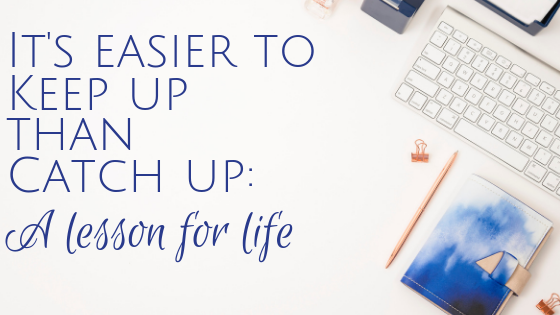It's easier to keep up than catch up: a lesson for life
/Listening to a podcast the other day, I heard the phrase, ‘It’s easier to keep up than catch up’, shared as a simple truth.
I realised it was true in so many ways and got thinking about how this applies to our lives. For the majority of us, keeping up will be far easier than catching up in many aspects of our lives. In fact, our day-to-day lives are generally geared around keeping up. Keeping up rather than catching up is one of the key reasons we create habits, systems, and routines—all of which assist us with streamlining our everyday lives.
But before I share more about the benefits of keeping up, I’d like to share a story about what can happen when we don’t keep up.
Risks of not keeping up
When working with a client recently, she shared that self-care was something utterly foreign to her. I explained that self-care does not mean massages and spa treatments (although it can!). Instead, self-care means looking after your own needs so that you can be the person you need to be. And the person you need to be includes all the roles you perform; partner, leader, parent, employee, friend, child, sibling and so on. In this context, self-care is showing ourselves the same kindness, compassion and generosity we show others.
My client confessed she had never prioritised herself, her well-being or her needs at any time in her life. Always, she put other people and their needs ahead of her own.
Does this sound familiar to you, too?
As women, and especially as mothers, this may be quite common and you might be nodding in agreement with my client. Yet, being a martyr does not help us to be the best parent or person we can be.
As a result of not keeping up with her self-care, my client was feeling rundown and exhausted.
She was empty. There was nothing left to give, and she was overwhelmed by the smallest request. Yet, of course, because she is a heart-centred, caring, and wonderful person, she would continue to give more to others while continuing to neglect her own needs.
The consequences were not good. She was feeling overwhelmed and worn out. Stress and anxiety were taking their toll on her health, and she was no longer turning up as the wife, mother and daughter she wanted to be.
My client had let her self-care get to a non-existent level. She had no time or energy left to care for herself. Thus, she had to play catch up.
Filling your tank from empty is a lot harder than topping up the tank as you go.
None of us want to get to a place where our health is suffering as a result of not keeping up with something we know we need.
This is why it’s so important to keep up with key routines, such as self-care, rather than trying to play catch-up.
Keep up, not catch up - other examples
The same logic applies to many other things in life. Whether at work, at home, or in other personal relationships, having a regular routine or system is often easier than waiting until we desperately need to do something. Below are some examples of where keeping up is far preferable to catching up.
Goals (professional or personal)
It is far easier to work a little bit each week towards and on our goals. By breaking down our goal into smaller actions or tasks, we are more likely to complete the actions and make progress. The alternative is to realise at the last minute that we have not undertaken what was required to achieve it and then nearly kill ourselves trying to get it done. This is certainly not ideal for our well-being or stress levels!
Exercise
We know the benefits of regular, daily exercise. Moving our bodies and keeping healthy are definitely areas of our lives where keeping up is wise and has enormous benefits in terms of overall health, longevity, and well-being.
Photo: Styled Stock Society
Career
Similarly, in our careers, consistent, predictable, and regular good performance far outweighs a last-ditch effort. Indeed, in my corporate life as an HR professional, I encouraged my business leaders to always look at the consistent performance of their team members, not those who deliver only when pushed. Most workplaces also tend to recognise and reward consistently strong performers, not those who are sporadic.
Friendships
Finally, we all know the benefits of regular catch-ups with friends. While some friendships stand the test of time, including infrequent contact, most of us feel more connected with regular contact with our friends. Scientific research supports this, too—regular contact with those we care about and love has been proven as one of the keys to longevity and lasting well-being.
And so, I find myself musing about how often in our life, keeping up is a better option than catching up. Whether it is keeping up with our self-care or simply about better, more intentional use of our time and the benefits of regular exercise and routines. In each case, keeping up seems to be a far better approach than catching up.
A valuable reminder of a key life lesson: keeping up is indeed better than catching up.
Support
If you find keeping up hard and often feel like you are trying to catch up, I’d love to help. One of the benefits of working with a Career and Life Coach (me!) is having someone hold you accountable to do the things you deeply desire to do, so you are keeping up and getting ahead and no longer catching up. Book your complimentary consultation today to learn more.













